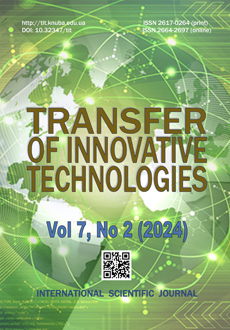Approaches to assessing the sustainability of territorial communi-ties
DOI:
https://doi.org/10.32347/tit.2024.7.2.01.05Keywords:
sustainable development, territorial community, bellagio principles, integral indicator, strategic prioritiesAbstract
Abstract. The article is devoted to exploring approaches and identifying sustainable development indicators for territorial communities. The ability to apply sustainable development principles in managerial decision-making regarding the development of territorial communities requires the establishment of priorities or goals for sustainable development. These priorities, in turn, must be based on criteria that can be measured and assessed.
Currently, sustainable development approaches are among the fundamental ones in preparing funding proposals for territorial communities or evaluating them from the perspective of potential investors. However, even though certain territorial communities actively use the defined term when preparing proposals or presenting the community to the public, few can accurately determine which specific indicators need to be calculated.
In the practice of managing a territorial community, various indicator systems are widely used to assess the state of a particular sphere of activity (or development direction) of the community from a chosen perspective (which underpins the formation of the indicator system).
An analysis of the literature revealed that there are sufficient approaches offering suggestions for defining indicators that can characterize the sustainable development of a community. The article proposes using the Bellagio principles to develop an approach for quantitative calculations. It also suggests the application of mathematical methods to calculate certain indicators.
The proposed approach includes, taking into account sectoral characteristics, groups of indicators for ensuring the livelihood of the population, territorial development, and entrepreneurial development, as well as indicators reflecting the social and environmental responsibility of the territorial community. This set of indicators can be used as criteria for substantiating managerial decisions in territorial communities
References
Stalinska, О.V. (2012) Implementation of the principles of sustainable development in the strategic management of the enterprise: monograph / NAS of Ukraine, Institute of Industrial Economics - Donetsk. – 320 p. (in Ukrainian).
Ovchynnikova, V.O. (2021-2022) Social re-sponsibility as a tool for ensuring the sus-tainable development of railway transport enterprises in the context of the socio-economic crisis / V. Ovchynnikova, M. Korin, G. Obruch, I. Chornobrovka // Bulle-tin of Trans-Port and Industry Economics. # 76-77. - pp. 58-69. (in Ukrainian).
Brandon, P.S. (2005) Evaluating Sustainable Development in the Built Environment / P.S. Brandon, P. Lombardi. – Hoboken: Wiley Blackwell, 2005. – 240 p.
Redko, K., Miroshnichenko, V. (2022) Sus-tainable Development Research in Ukraine: Assessment of the Status of Goals Implemen-tation. Entrepreneurship and innovation. 2022. № 22. С. 5-13. DOI: https://doi.org/10.37320/2415-3583/22.1
Daly, H. (1991), Sustainable Development: From Concept and Theory towards Opera-tional Principles. Steady State Economics, 2nd edition, Island Press, Washington, USA.
Dow Jones Sustainability World Indexes Guide Book [Electronic resource] / Dow Jones Sustainability Indexes. – Mode of ac-cess: http://www.sustainability-index.com/djsi_pdf/publications/ Guide-books/ DJSI_World_Guidebook_11%206_final.pdf/.
Business strategy for sustainable develop-ment: leadership and accountability for the'90s, International Institute for Sustainable Development, Deloitte & Touche, World Business Council for Sustainable Develop-ment, London, UK, available at: https://www.iisd.org/business/pdf/business_strategy.pdf
Voronkova, A.Ye. (2000) Strategic manage-ment of the competitive potential of the en-terprise: diagnostics and organization / A.Ye. Voronkova. - Luhansk: VNZ, 2000. - 310 p. . (in Ukrainian).
Kaplan, R. S., McMillan, D. (2020) Updating the Balanced Scorecard for TripleBottom Line Strategies. Working Paper 21-028. Har-vard Business School.
Downloads
Published
How to Cite
Issue
Section
License

This work is licensed under a Creative Commons Attribution 4.0 International License.
Our journal abides by the CREATIVE COMMONS copyright rights and permissions for open access journals.
Authors, who are published in this journal, agree to the following conditions:
1. The authors reserve the right to authorship of the work and pass the first publication right of this work to the journal under the terms of a Creative Commons Attribution License, which allows others to freely distribute the published research with the obligatory reference to the authors of the original work and the first publication of the work in this journal.
2. The authors have the right to conclude separate supplement agreements that relate to non-exclusive work distribution in the form in which it has been published by the journal (for example, to upload the work to the online storage of the journal or publish it as part of a monograph), provided that the reference to the first publication of the work in this journal is included.




